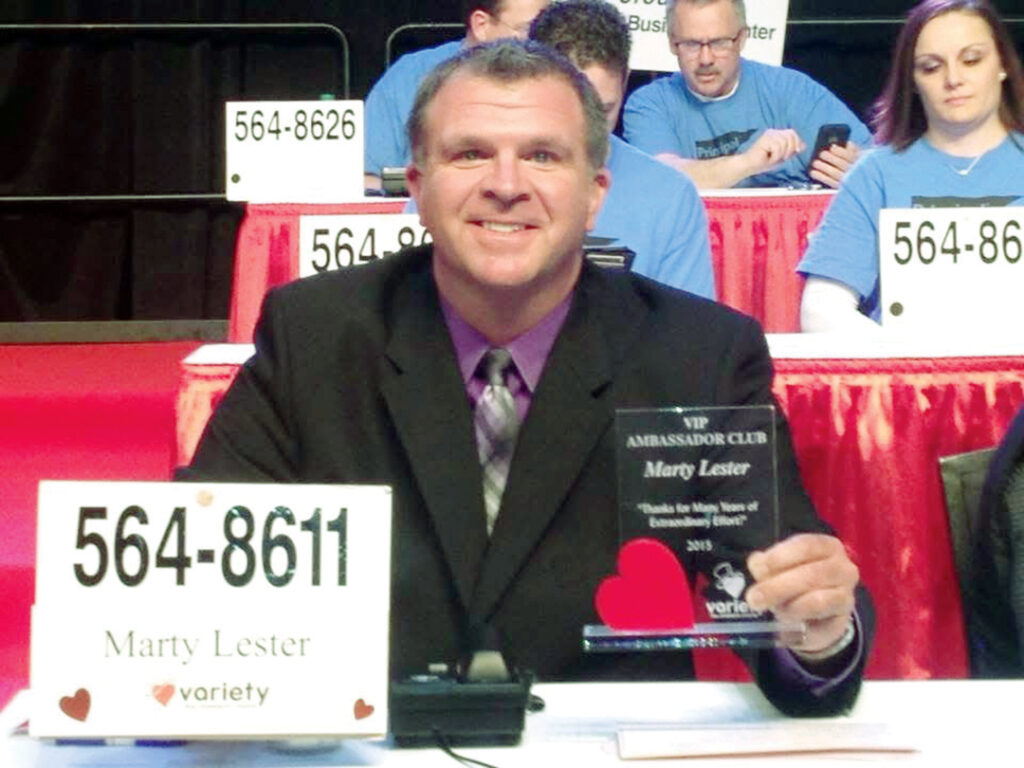Lester reflects on 20-plus years at Mentor Iowa
7/2/2025
“We just want to be there and to give these kids a chance. That’s what keeps me going to hopefully year 30. It seems so long. I just hope my back holds up,” Marty Lester said.
The mission statement for Mentor Iowa, an organization founded in 1974, is to provide trained volunteer mentors to at-risk children in need of a positive adult role model. They do this by working in partnership with the children, their families and the community. Executive Director Marty Lester has led that charge for more than 20 years.
Lester decided on his next life move after wrestling at Ellsworth Community College.
“I got my associate of arts degree there. And then I also realized I wasn’t very good at wrestling. I decided to call it a wrap on that, and I went to Iowa State,” Lester said.
It took some time for Lester to decide what he wanted to do with his adventure at ISU. He thought of accounting but changed to journalism. The pressure of deadlines and lack of creative freedom took him away from the field. He settled on leisure studies, now renamed recreational management. But, once again, Lester pivoted, finding his calling at the Boys and Girls Club of Iowa. His breakthrough came just three months into his time there at a regional training.
“That was like my first real position. I was a team director/janitor for the club in Ames. One of the directors of the national organization was there, and they went around and asked everybody, ‘Where do you see yourself in five years?’ So, some people were like, ‘hopefully married,’ you know, ‘stay at home mom.’ All good answers. Some are like, ‘I’m hopefully going to go back to school,’ that kind of stuff,” Lester said. “When it got to me, I said, ‘Well, I see myself wanting to become president of Boys and Girls Clubs of America.’ And everybody kind of laughed. I’m like, ‘No, I’m serious. I love the mission. I love everything about this, and I just want to make an impact with kids.’ After that little session, he pulled me aside and said, ‘How serious are you?’ I said, ‘Let’s do it.’ ”
Lester did not become the organization’s president, but, after several years there, he became executive director. Lester had the urge to be closer to his kids and ended up joining Mentor Iowa as its executive director in 2003.
In his role, Lester wears a number of hats, whether it be writing personalized thank you notes to those who donate, or working with the matchmakers to continue the organization’s mission.
The referral process differs from how other similar groups operate.
“We work with the juvenile justice system, whether it be through Juvie, through the Department of Health and Human Services, it could be through juvenile court services. We also work with our local school districts, so we’ll have their social workers or guidance counselors identify some kids who could definitely benefit from having a positive adult role model in their life,” Lester said.
After 20 years of helping set up matches, Lester says a good match is like a tripod. It involves the mentor, the parent and the child.
“A lot of times, we’ll have people that’ll call out to us and be like, ‘Hey, my kid needs a mentor.’ OK, that’s great. Have you asked the kid? If you pull out one of those legs, it’s going to tip over,” Lester said.
Mentors can serve as a crucial support system for area children battling some of the worst conditions. That is part of the reason it is key to make sure the match — and the tripod — are stable.
“We just want that mentor to be a resource for them, somebody who they can talk to when they have an issue, somebody that they can share their joys with, and somebody that can be there for them even in those darkest and most difficult times,” Lester said.
Lester says there is no linear path to show that a mentor has been successful. Success can come in a variety of ways. For some, it’s becoming the first in their family to graduate from high school. For others, some of the kids have become counselors, and one became a mentor themself. For some, it’s finding a stable job.
“Seeing them go to college, too, or a trade school, things like that. Sometimes when people don’t believe, they don’t believe in themselves either. Just to have that one person that did believe in them, that’s pretty cool. If in any way, shape or form, we help build their self-esteem at one point, to me, that’s a success story. And if they can be a better person for it, that’s a success,” Lester said.
Lester says there is one major reason why he has been helping to lead Mentor Iowa.
“I think, ultimately, it is the smiles. A lot of the time, the mentors become my friends. I mean, how cool is that to have a job where you can have those friendships that last even beyond when a match may end? That’s priceless to be in those opportunities,” Lester said.
Lester also pointed to Mentor Iowa’s group events, like their Back to School Bash. A volunteer coordinator made it a mission to make sure none of the kids in their program started off the school year on the wrong foot. Mentor Iowa has had success with this program, and Lester is determined to keep it going.
“Whether it’s a $5 donation or a $10,000 donation, every donation makes a difference, and it helps us keep the doors open,” Lester said.
And, whether it’s a $5 donation or a $10,000 donation, you can expect a thank you note from Lester.















